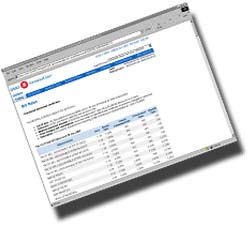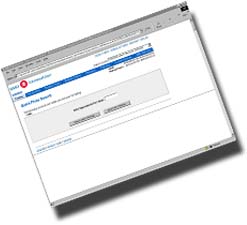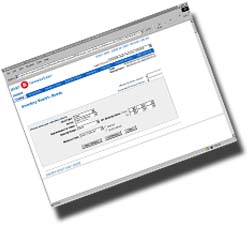
Fixed Income
If Fixed Income is part of your plan, you can search through our bond inventory in our Fixed Income Online. Just specify your criteria, find the bond that's suitable, and make the purchase – all in one visit.
Quick Picks helps you cut through the clutter. Quick Picks provides you with a representative sample of the most popular fixed income products - Bonds, Coupons/Residuals, T-Bills and Money Market securities, either Canadian or U.S., for a variety of a maturity dates.
Use our Inventory Search tool to look through our entire fixed income inventory to select the specific Canadian or U.S. fixed income product that is right for you. Our tool allows you to specify the criteria that you feel are important. Start by selecting a particular product type: bonds, coupons/residuals, T-Bills and Money Market.
Purchase a GIC from either BMO Financial Group or from a list of the best 1 to 5 year rates currently available from other issuers. To purchase a GIC click on the GIC name to review term, interest rate and payment terms, minimum order and order increments.

Cashable GICs may be fully redeemed online within the cashable period up to 30 calendar days prior to maturity. To redeem any of your GICs, simply click on the GIC description.
Why choose fixed income products?
Search, buy and sell a wide range of Canadian or U.S. fixed income products such as bonds, debentures and money market instruments online.
- cut through the clutter and review our Quick Picks - a representative sample of the most popular fixed income products for a variety of maturity dates
- search our vast online inventory for the fixed income product that meets your investment criteria
- choose from various products including federal, provincial and corporate bonds, strip coupons and residual bonds, T-Bills, commercial paper and bankers' acceptances
- get price, yield and maturity dates of the fixed income product that interests you and execute the trade -- all in one visit
- purchase a GIC from either BMO Financial Group or from a list of the best 1 to 5 year rates currently available from other issuers
Fixed Income Products
We offer a broad range of fixed income products that allow you to customize your portfolio.
- Money Market Products
- GOC T-Bills are fully backed by the Government of Canada and are generally offered in 30, 60, 90, 180 or 360 day maturities.
- T-Bills are bought at a discount and mature at the stated face value.
- The minimum face value for purchase is $5,000 and in $1,000 increments thereafter.
- BAs are short-term debt obligations issued by non-financial institutions and "accepted" by the borrowers' bank (the interest and principal are guaranteed by the borrowers' bank).
- BAs are bought at a discount and mature at the stated face value.
- The minimum face value available for purchase is $50,000 and in $1,000 increments thereafter.
- CP is a short-term promissory note issued by a major corporation.
- Secured by the general creditworthiness of the issuer.
- CP is bought at a discount and matures at the stated face value.
- The minimum face value available for purchase is $50,000 and in $1,000 increments thereafter.
- Government of Canada Treasury Bills (GOC T-Bills)
- Bankers Acceptances
- Commercial Paper
- Guaranteed Investment Certificates (GICs)
- Bonds and Debentures
- $5,000 face value
- $1,000 increments thereafter
- Created by separating the semi-annual coupons ("the coupon") of a (usually Government of Canada or Provincial) bond from the principal ("residual"), or face value. The two components are then traded on the open market separately.
- Bought at a discount, mature at face value, and pay no interest during the term of the bond. Strip bond yields are more sensitive to price fluctuations, but often generate slightly better returns than similar coupon-bearing bonds.
- Reduces the reinvestment risk for the duration of the investment (e.g. the possibility that your coupon payments will not be reinvested at the same rate as your initial investment). If you hold your strip to maturity, the rate of return is determined at the time of purchase.
- Since investors who hold strip bonds are responsible for the tax on the annual interest which accrues (but is not paid), strips may be more suited for tax-deferred accounts such as RRSPs and RRIFs.
- Contains a provision which gives the issuer the right to retire the bonds on a specified future date. When the bond is called for redemption, its yield is affected.
- In certain situations, the yield-to-call may be a better indication of the likely yield that you will receive as an investor.
- Since the call provision can impact the maturity and the yield of the issue, these callable issues generally provide slightly higher yields than a comparable straight issue.
- Allows the bondholder the option of converting the bond into the underlying stock of the company. This feature provides an added incentive by allowing the investor to participate in the movement of the underlying stock.
- However, having the right to convert the bond is usually at the cost of a lower yield relative to a comparable straight bond.
Corporate bond yields will vary depending on the credit rating of the issuer, the term-to-maturity and any inclusion of the above special provisions. - In general, corporate bonds are less liquid than government bonds due to the relatively smaller amount of outstanding issues.
- Minimum initial investment is $5,000 face value and in $1,000 increments thereafter.
- Federal and Provincial Government Bonds
- Strip Coupons and Residual Bonds
- Corporate Bonds
Money Market products
Government of Canada T-Bills (GOC T-Bills)Bankers Acceptances (BAs)
Commercial Paper (CP)
Government of Canada T-Bills (GOC T-Bills)
GOC T-Bills are fully backed by the Government of Canada and are generally offered in 30, 60, 90, 180 or 360 day maturities. T-Bills are bought at a discount and mature at the stated face value. The minimum face value for purchase is $5,000 and in $1,000 increments thereafter.
Bankers Acceptances (BAs)
BAs are short-term debt obligations issued by non-financial institutions and "accepted" by the borrowers' bank (the interest and principal are guaranteed by the borrowers' bank). BAs are bought at a discount and mature at the stated face value. The minimum face value available for purchase is $50,000 and in $1,000 increments thereafter.
Commercial Paper (CP)
CP is a short-term promissory note issued by a major corporation. It is secured by the general creditworthiness of the issuer. CP is bought at a discount and matures at the stated face value. The minimum face value available for purchase is $50,000 and in $1,000 increments thereafter.
Guaranteed Investment Certificates (GICs)
GICs are issued by chartered banks, trust companies, and mortgage and loan companies and range in maturities from one to five years. You can decide to receive interest payments in an annual, semi-annual, monthly or compound form and your principal from any one issuer is guaranteed by the CDIC for up to $100,000.
Simple and convenient, BMO InvestorLine also offers a variety of 1 year cashable GICs, which are fully cashable (with accrued interest) after 30 days. Minimum purchase amount for cashable GICs is $10,000.
The minimum purchase amounts vary with the term to maturity as follows:
| Term | Minimum Purchase Amount |
|---|---|
| 1 year and Cashables | $10,000 |
| 1 year | $5,000 |
| 2 year | $5,000 |
| 3 year | $5,000 |
| 4 year | $5,000 |
| 5 year | $5,000 |
Bonds and Debentures
Federal and Provincial Government Bonds
Government of Canada (GOC) bonds offer the highest credit quality available in the Canadian bond market and provide a regular, semi-annual income stream for investors.
Within the provincial bond market, the creditworthiness and liquidity will vary depending on the particular issuer.
-
Minimum initial investment:
Visit Standard & Poor's and Dominion Bond Rating Service to look up corporate and Canadian government bond issuers' ratings.
-
Strip Coupons and Residual Bonds
BMO InvestorLine offers government-guaranteed strip bond packages. Ask us for details.
Corporate Bonds
Many corporate bonds are issued with special features - for example, a "callable" bond or a "convertible" bond.
-
A callable bond
-
A convertible bond
Federal and Provincial Government Bonds
Government bonds provide a regular, semi-annual income stream for investors.
Government of Canada (GOC) bonds offer the highest credit quality available in the Canadian bond market and have a very liquid secondary market. Within the provincial bond market, the creditworthiness and liquidity will vary with respect to the particular issuer.
Minimum initial investment is $5,000 face value and in $1,000 increments thereafter.
Visit Standard & Poor's and Dominion Bond Rating Service to look up corporate and Canadian government bond issuers' ratings.
Strip Coupons and Residual Bonds
Strips are created by separating the semi-annual coupons of a (usually Government of Canada or Provincial) bond from the principal, or face value. The two components are then traded on the open market separately with the former known as the "coupon" and the latter as the "residual".
Similar to T-Bills, strips are bought at a discount, mature at face value, and pay no interest during the term of the bond. While the absence of interest payments makes strip bond yields more sensitive to price fluctuations, they often generate slightly better returns than similar coupon-bearing bonds.
Strips also reduce reinvestment risk for the duration of the investment (i.e., the possibility that your coupon payments will not be reinvested at the same rate as your initial investment). If you hold your strip to maturity, the rate of return is determined at the time of purchase. The existence of reinvestment risk is the reason why coupon-bearing bonds are quoted in semi-annual yields and strips are quoted in annual yields.
Strips are geared towards investors who want to lock-in their rate of return with minimal risk. Since investors who hold strip bonds are responsible for the tax on the annual interest which accrues (but is not paid), strips may be more suited for tax-deferred accounts such as RRSPs and RRIFs.
Minimum initial investment is $5,000 face value and in $1.00 increments thereafter.
Corporate Bonds
Many corporate bonds are issued with special features - for example, a "callable" bond or a "convertible" bond.
A callable bond contains a provision which gives the issuer the right to retire the bonds on a specified future date. When the bond is called for redemption, its yield is affected. In addition to the bond's yield-to-maturity, you may also want to be aware of its yield-to-call. In certain situations, the yield-to-call may be a better indication of the likely yield that you will receive as an investor.
Since the call provision can impact the maturity and the yield of the issue, these callable issues generally provide slightly higher yields than a comparable straight issue.
A convertible bond allows the bondholder the option of converting the bond into the underlying stock of the company. This feature provides an added incentive by allowing the investor to participate in the movement of the underlying stock. However, having the right to convert the bond is usually at the cost of a lower yield relative to a comparable straight bond.
Corporate bond yields will vary depending on the credit rating of the issuer, the term-to-maturity and any inclusion of the above special provisions. In general, corporate bonds are less liquid than government bonds due to the relatively smaller amount of outstanding issues.
Minimum initial investment is $5,000 face value and in $1,000 increments thereafter.
















